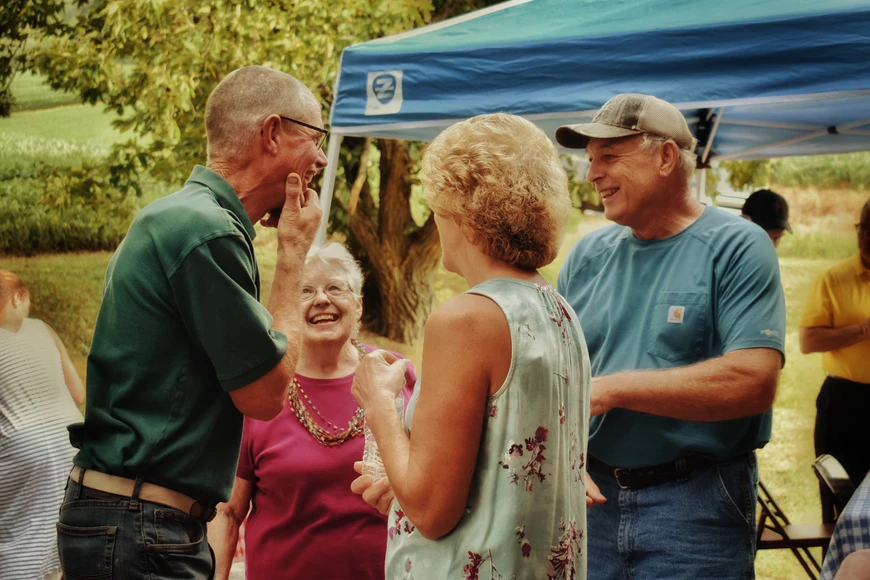
As we’ve previously reported, loneliness is a growing epidemic with significant consequences for many groups in society. One of these groups is the elderly – loneliness has been seen to affect around 10-13% of older people, and has been found to increase the risk of premature death by 30%.
Making connections
Creating relationships and connections is an important way of tackling loneliness, and the Rural Services Network has highlighted some good examples of bringing people together
These include “Village Agent” schemes, which link people in rural areas with advice and support services for independent living. Another initiative – the “Rural Coffee Caravan Information Project” – specifically targets rural areas of the country, where there may be fewer opportunities to meet through shopping, meeting for food or simply seeing other people. This project allows older people to meet at a caravan where they are given coffee, tea and homemade cakes, as well as providing information on helpful services.
Along these lines is also the “Talk Eat and Drink” (TED) project launched in 2015, which was initially funded by the Big Lottery’s “Fulfilling lives: ageing better” programme. This allowed older people to become involved in activities such as ‘Sing For Your Supper’, ‘Fish and Chips Friday’ and a Sunday pub lunch, which not only enabled people to bond with others, but also ensured that they were being fed properly, especially if they were struggling with cooking at home or getting food for themselves.
Artistic endeavours
Another way to tackle loneliness in older people is through the arts. A report from the Baring Foundation has found that it is important for older people to have a range of activities and opportunities to connect them to others; the arts can be effective not only in keeping people in touch with others, but also in helping with health-related issues like dementia.
The arts exemplifies the principles behind ‘five ways to wellbeing’: connecting, being active, learning, taking notice and giving. Being able to create things allows older people to use their minds and skills to express themselves. They can also have enhanced self-confidence from the feeling of doing something for themselves.
Organisations such as Arts4Dementia and Artz (Artists for Alzheimer’s) have been able to help people living with dementia, including help with their co-ordination and wellbeing. Other companies like Spare Tyre use theatre to create multi-sensory productions, while the Library Theatre Company in Manchester delivers sensory workshops for people living with dementia which provide fun with props and music.
One of the biggest issues with this form of help is that the arts tend to be overlooked by local authorities and therefore don’t have enough funding. However, Manchester City Council, has been working to make their city more ‘age friendly’ and in particular to provide cultural activities for older people.
There have also been examples of “arts by prescription” where GPs have referred patients to arts projects to improve their mental health. This is part of the wider ‘social prescribing’ approach which our blog has previously covered.
Everyday skills
Other forms of tackling loneliness in older people include helping them develop skills through, for example, volunteering. Projects such as Touchstone in Yorkshire allowed people to self-refer themselves, or be referred through GPs and Age UK, where they could learn practical skills with other older people. 91% of those taking part felt they were more involved or connected with their community, and 86% felt they had more confidence to meet people.
Another programme by the charity Open Age, in London, created opportunities for older people to keep up with the performing arts, physical activity, digital skills, lunch groups, and trips. While these did cost money, they were only £1 an hour and were pay-by-session and drop in, which made it slightly more accessible. However, even these small amounts may be out of reach for those already struggling to make ends meet.
Final thoughts
Overall, there seems to be a range of activities and opportunities for older people to not only meet others and form connections, but learn new skills they can utilise for themselves.
However, it’s important to remember that older people are not a homogenous group, and no single approach will work for everyone. But as long as careful thought goes into ensuring that the needs of older people are at the heart of initiatives to tackle loneliness, the chances of success will be all the greater.
Photo by leah hetteberg on Unsplash
If you enjoyed reading this, you may also like:
- ‘All the lonely people’ – tackling the epidemic of loneliness
- ‘Digital prescribing’ – could tech provide the solution to loneliness in older people?
- Virtual reality: a game changer for mental health treatment?
Follow us on Twitter to find out which topic are interesting our research team
Share
Related Posts
A recent item on BBC Radio 4’s Today programme generated an unusually high number of responses from listeners. A man who had lost his job in the financial services sector at the age of 57 described his difficulty in trying ....
By Donna Gardiner While free school meals (FSM) have been available in England on a means-tested basis since 1944, recent years have seen a renewed focus upon the potential benefits of providing free school meals to all school-aged children. Currently, ....
By Robert Kelk and Chris Drake A new start for an old challenge? The recent appointment of Marc Lemaître as the European Commission’s director general for research and innovation (R&I) has returned Europe’s R&I gap to the spotlight. Previously head ....
Today sees the start of Community Garden Week 2023. Across the UK, communities will be celebrating the many and varied types of community gardens, from children’s and neighbourhood gardens to therapy gardens and allotments. The benefits of community gardens are ....
